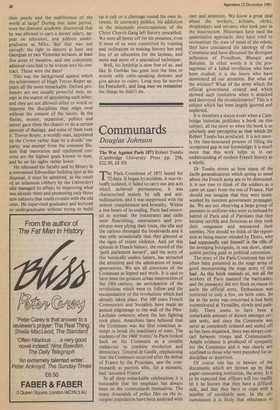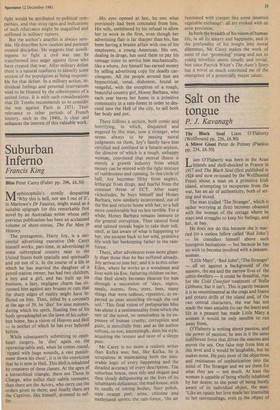Communards
Douglas Johnson
The War Against Pads 1871 Robert Tombs (Cambridge University Press pp. 256, £22.50, £8.50) The Paris Commune of 1871 lasted for 72 days. It began by accident, it was vir tually isolated, it failed to carry out any acts which achieved permanence, it was characterised mainly by talk and attitudinisation, and it was suppressed with the utmost completeness and brutality. Within a few hours of its ending, Paris had returned to normal: the restaurants and cafés were flourishing, entertainers and prostitutes were plying their trade, the idle and the curious thronged the boulevards and it was only occasionally that they glanced at the signs of recent violence. And yet this episode in French history, the record of this 'petit parlement bavard', and the story of this heroically useless failure, has attracted the attention and the admiration of many generations. We are all conscious of the Commune as legend and myth. It is said to have been the greatest urban insurrection of the 19th-century, an anticipation of the revolutions which were to follow and the encapsulation of the revolutions which had already taken place. For 100 years French Communists and Socialists have made an annual pilgrimage to the wall of the PereLachaise cemetery where the last fighting took place. Anarchists have believed that the Commune was the first conscious attempt to break the machinery of state. The students of the 1968 'events' in Paris looked back on the Commune as a notable endeavour to combine revolution and democracy. General de Gaulle, emphasising that the Commune occurred after the defeat of France by the Prussians, saw the cornmunards as patriots who, for a moment, had 'assumed France'.
In all these remarkable celebrations it is noticeable that the emphasis has always been on the communards themselves. The many thousands of police files on the insurgent population have been analysed with care and attention. We know a great deal about the workers, artisans, clerks, shopkeepers and servants who took part in the insurrection. Historians have used the quantitative approach; they have tried to reconstitute the state of mind of the rebels; they have considered the ideology of the Commune and have discussed the divergent influences of Proudhon, Blanqui and Bakunin. In other words it is the protagonists of a failed revolution who have been studied; it is the losers who have dominated all our attention. But what of the winners? What of the army which the official government created and which showed such resolution when it attacked and destroyed the revolutionaries? This is a subject which has been largely ignored and neglected.
It is therefore a major event when a Cambridge historian publishes a book on this subject, all the more so when the book is as scholarly and perceptive as that which Dr Robert Tombs has produced. It is not merely the time-honoured process of filling the recognised gap in our knowledge; it is much more that this work helps us in our understanding of modern French history as a whole.
Dr Tombs shows us how many of the facile generalisations which spring to mind about the French army are to be distrusted. It is not true to think of the soldiers as a caste set apart from the rest of France. Nor should one imagine that they were brainwashed by insistent government propaganda. We are not observing a large group of peasants in uniform who were so imbued by hatred of Paris and of Parisians that they became terrible and ferocious as they took their vengeance and massacred their enemies. Nor should we think of the repression as being master-minded by Thiers, who had supposedly cast himself in the role of the avenging bourgeois, in one short, sharp action putting paid to political extremism.
The story of the Paris Commune has too often been presented as the stage army of good encountering the stage army of the bad. As this book reminds us, not all the workers of Paris manned the barricades, and the peasantry did not flock en masse to assist the official army. Enthusiasm was restricted to only a few, on both sides. So far as the army was concerned it had been reconstituted at Versailles, slowly and painfully. There seems to have been a remarkable amount of dissent amongst certain units, and since the Commune was never as completely isolated and sealed off as has been imgained, there was always contact between troops and Communards. Ample evidence is produced of sympathy for the Commune and it was clearly not confined to those who were punished for indiscipline or desertion.
Of course one has to beware of the documents which are thrown up by that paper-consuming institution, the army. It is to be expected that officers will too readily let it be known that they have a difficult task, and that they have to cope with a number of unreliable men. In the circumstances it is likely that reluctance to fight would be attributed to political sympathies, and that stray signs and indications of such reluctance might be magnified and stiffened in military reports.
But the author's anaylsis is always sensible. He describes how caution and patience created discipline. He suggests that unwillingness to fight a civil war can be transformed into anger against those who have created that war. After military defeat there is a natural readiness to identify some section of the population as being responsible for that defeat. In a military action, individual feelings and personal reservations tend to be blunted by the cohesiveness of a united force. It is with such considerations that Dr Tombs recommends us to consider the war against Paris in 1871. Their relevance to other periods of French history, such as the 1940s, is clear and enhances the interest of this valuable work.







































 Previous page
Previous page